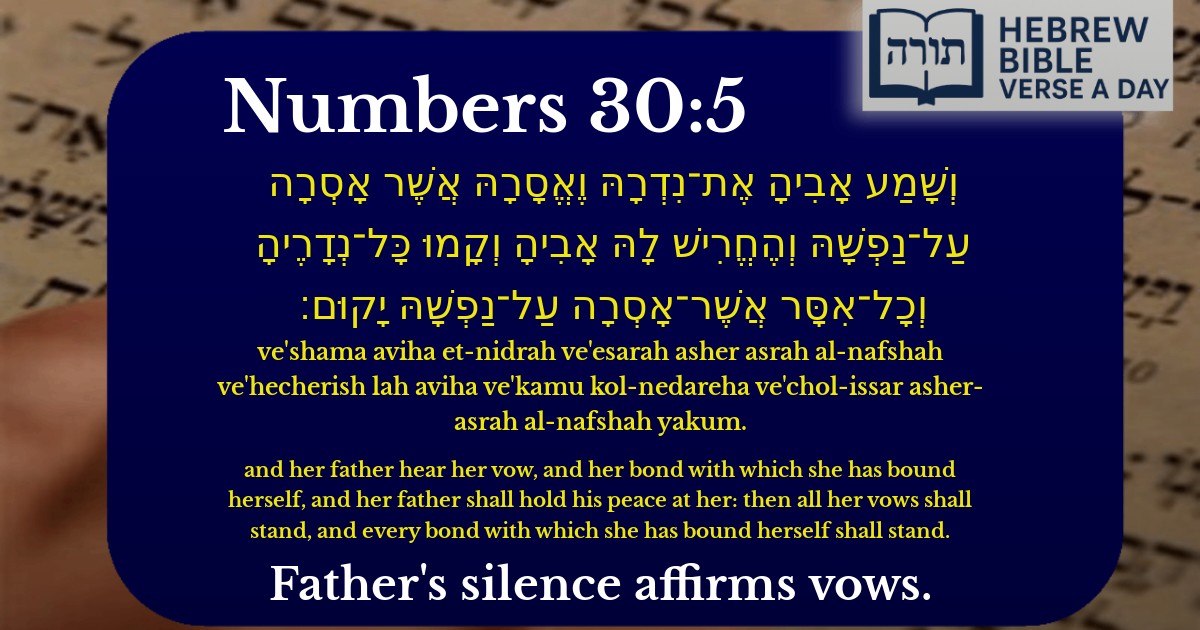Join Our Newsletter To Be Informed When New Videos Are Posted
Join the thousands of fellow Studends who rely on our videos to learn how to read the bible in Hebrew for free!
Hebrew Text
וְשָׁמַע אָבִיהָ אֶת־נִדְרָהּ וֶאֱסָרָהּ אֲשֶׁר אָסְרָה עַל־נַפְשָׁהּ וְהֶחֱרִישׁ לָהּ אָבִיהָ וְקָמוּ כָּל־נְדָרֶיהָ וְכָל־אִסָּר אֲשֶׁר־אָסְרָה עַל־נַפְשָׁהּ יָקוּם׃
English Translation
and her father hear her vow, and her bond with which she has bound herself, and her father shall hold his peace at her: then all her vows shall stand, and every bond with which she has bound herself shall stand.
Transliteration
Ve'shama aviha et-nidrah ve'esarah asher asrah al-nafshah ve'hecherish lah aviha ve'kamu kol-nedareha ve'chol-issar asher-asrah al-nafshah yakum.
Hebrew Leining Text
וְשָׁמַ֨ע אָבִ֜יהָ אֶת־נִדְרָ֗הּ וֶֽאֱסָרָהּ֙ אֲשֶׁ֣ר אָֽסְרָ֣ה עַל־נַפְשָׁ֔הּ וְהֶחֱרִ֥ישׁ לָ֖הּ אָבִ֑יהָ וְקָ֙מוּ֙ כׇּל־נְדָרֶ֔יהָ וְכׇל־אִסָּ֛ר אֲשֶׁר־אָסְרָ֥ה עַל־נַפְשָׁ֖הּ יָקֽוּם׃
Parasha Commentary
📚 Talmud Citations
This verse is quoted in the Talmud.
📖 Nedarim 70b
The verse is discussed in the context of the laws regarding vows made by a daughter and the father's right to annul them.
📖 Kiddushin 44a
The verse is referenced in a discussion about the authority of a father over his daughter's vows.


Context of the Verse
This verse (Bamidbar 30:5) appears in the Torah portion discussing the laws of vows (nedarim) and their annulment. It specifically addresses the case of a young woman still living in her father's household, whose vows may be upheld or nullified by her father under certain conditions.
Explanation of the Text
The verse states that if a father hears his daughter's vow or self-imposed prohibition (issar) and remains silent, the vow remains binding. Rashi explains that the father's silence is considered implicit approval, causing the vow to take full effect. The phrase "וְהֶחֱרִישׁ לָהּ" ("and her father shall hold his peace at her") indicates that his inaction validates her commitment.
Halachic Implications
Spiritual Lessons
The verse underscores the gravity of speech and vows in Jewish thought. The Chofetz Chaim (in Shemirat HaLashon) teaches that words create spiritual realities, and this verse reminds us of the need for mindfulness in making commitments. Additionally, the father's role highlights the Torah's framework of accountability within family structures.
Practical Applications